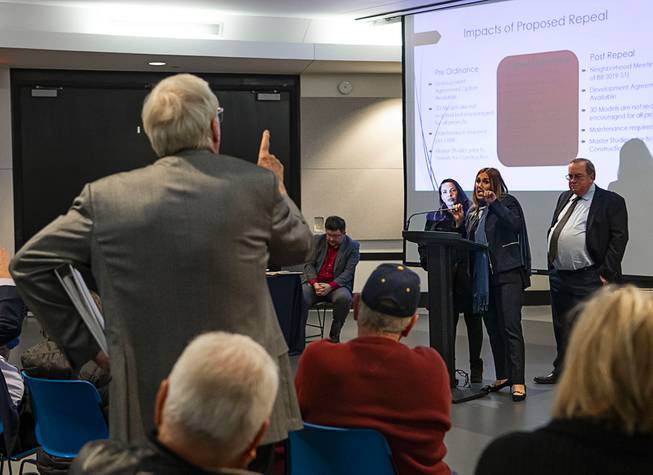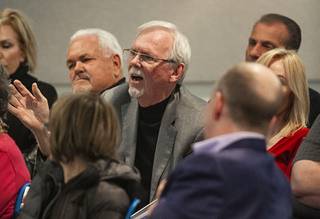
Miranda Alam / Special to the Sun
Frank Schreck speaks to Las Vegas City Councilwoman Victoria Seaman during a town hall meeting at the Sahara West Library in Las Vegas on Tuesday, Dec. 17, 2019.
Published Wednesday, Jan. 15, 2020 | 7 p.m.
Updated Wednesday, Jan. 15, 2020 | 11 p.m.
The Las Vegas City Council voted 4-3 Wednesday to repeal a 2018 ordinance that required developers to take extra steps to consult with residents before they could redevelop on golf courses and open spaces.
The ordinance mandated that developers hold neighborhood meetings with affected residents, create a mitigation plan to reduce impacts on schools, traffic and infrastructure, write a statement outlining alternative uses of the open space and author a closure maintenance plan for the land. Ward 2 Councilwoman Victoria Seaman proposed the repeal of the ordinance, which had been championed by her predecessor, former councilman Steve Seroka.
Joining Seaman, Ward 1 Councilman Brian Knudsen, Mayor Pro Tempore Michele Fiore and Mayor Carolyn Goodman voted to repeal the ordinance. Ward 4 Councilman Stavros Anthony, Ward 3 Councilwoman Olivia Diaz and Ward 5 Councilman Cedric Crear voted against the repeal. Fiore and Goodman also voted against the original ordinance in 2018.
Critics of the so-called open space ordinance have described it as overly burdensome for developers seeking to build on green spaces, while supporters say it protects neighborhoods and ensures residents are included in development discussions. The ordinance was developed in response to multiple instances a few years ago in which developers bought and sought to develop on land that had previously been set aside as open space, said planning director Robert Summerfield.
On Wednesday, councilors who voted to annul the ordinance said they believed it would save the city money as it fights lawsuits from a particular developer, EHB Companies.
EHB is seeking to build hundreds of homes on the shuttered Badlands Golf Course in Ward 2’s Queensridge neighborhood, thereby eliminating open space that Queensridge residents say they are entitled to through their master plan. The open space ordinance has been pinned onto that controversial case, although the development requirements — and the implications of repealing them — apply to properties citywide.
The city has spent hundreds of thousands of dollars in legal fees relating to the proposed redevelopment of Badlands, with the company claiming the city has violated its property rights by stalling the approval process. In repealing the open space ordinance, Seaman said she wants to protect taxpayers from further legal fees.
Goodman and Knudsen appeared to agree with that argument.
“I think the city should be spending money on services for our community, as opposed to lawyers,” Knudsen said.
In addition to repealing the ordinance, the council unanimously approved new provisions that will require developers to hold one advertised neighborhood meeting when they are considering replacing open space with new development. Seaman also sponsored those new provisions, which she said balance development needs while protecting residents’ properties.
But Queensridge residents, who have adamantly opposed repealing the ordinance, say the new provisions are inadequate. Bob Peccole, an attorney representing some homeowners in Queensridge, asked Seaman to listen to her constituents, as she has pledged to do on other issues.
“There has been so much opposition to the repeal of this bill that I would only say, please follow your own statements,” Peccole said.
Other homeowners opposed to the repeal questioned the assumption that doing so would resolve ongoing litigation.
“It’s misinformation,” said Queesnridge resident Paula Quagliana. “The fact is, homeowners and associations can file just as expensive lawsuits against the city. That means more taxes and maybe more settlements.”
Crear made a similar point, noting that no developers other than EHB have complained about the ordinance even though it applied to all projects that involved the development of open space.
“If there was an issue with this ordinance that directly affected developers or directly affected real estate, they would’ve come out in full force and tried to speak with us,” Crear said.
Anthony, whose ward encompasses properties adjacent to large open spaces such as Sun City Summerlin and Desert Shores, said his constituents urged him to defend the open space ordinance. While the ordinance did not prevent open spaces from being redeveloped, it did require extra steps before a developer could alter them, to the benefit of homeowners and property values, Anthony said.
“I’m not going to repeal this ordinance. It was passed 4-2 by the city council, and I have no reason to repeal it based on who I represent in Ward 4,” Anthony said.
Despite that the majority of people commenting on the measure opposed the repeal, Fiore accused Queensridge residents present at the meeting of misrepresenting the positions of their neighbors. She played a voicemail she said she received from Shelley Berkley, a former congresswoman who Fiore said was a Queensridge resident, urging the council to “move forward” on the Badlands issue.
“The few of you that are here, and when you gathered in the beginning with 50, it’s really not the majority,” Fiore said.
The only contingency present that voiced support for the repeal was Laborers Local 872, a construction workers union whose members claimed the ordinance stifles development and has kept its members out of work. The union collaborated with Seaman last year in an attempt to recall Seroka over his handling of the Badlands issue.
“I’ve seen both arguments and feel the central project and others like it must move forward, and I urge your support,” said union member Thomas Morley.

